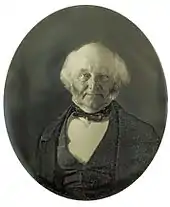1848 Free Soil & Liberty national conventions
The Free Soil Party was organized for the 1848 US election to oppose further expansion of slavery into the western territories. It included anti-slavery members of the Whigs, and drew much of its support anti-slavery Democrats, including former President Martin Van Buren.
When the Whigs nominated slave owner Zachary Taylor for president, and took no position on the anti-slavery Wilmot Proviso, prominent Conscience Whigs including Henry Wilson and Charles Allen, withdrew from the party's national convention and issued a call for anti-slavery advocates to meet with the goal of forming a new party. The party included prominent abolitionists such as Salmon P. Chase and John Parker Hale, and held its 1848 convention in Utica and Buffalo, New York. On June 22, Van Buren defeated Hale by a 244-183 delegate count to capture the Free Soil nomination for president, while Charles Francis Adams Sr., the son and grandson of presidents, was chosen as the vice-presidential nominee.
Van Buren knew that the Free Soilers had no chance of winning; he hoped that his candidacy would split the Democratic vote and throw the election to the Whigs. Van Buren pursued this strategy partly from personal animus towards Lewis Cass, whom he blamed for preventing him from obtaining the Democratic nomination in 1844, and dislike of the pro-slavery principle of popular sovereignty, which Cass championed.[1] Van Buren's plan proved successful; he obtained enough votes in New York to deny the state to Cass, which was enough to provide Taylor's margin of victory.
| Presidential vote | Vice Presidential vote | ||
|---|---|---|---|
| Martin Van Buren | 244 | Charles Francis Adams Sr. | 467 |
| John Parker Hale | 183 | ||
| Joshua R. Giddings | 23 | ||
| Charles Francis Adams Sr. | 13 | ||
| Others | 4 |
Free Soil party platform
Among the positions adopted by the party in its convention were:[2]
- We…propose no interference by Congress with slavery within the limits of any state.
- …it is the duty of the federal government to relieve itself of all responsibility for the existence or continuance of slavery wherever the government possesses constitutional power to legislate on that subject, and is thus responsible for its existence.
- …we accept the issue which the slave power has forced upon us; and to their demand for more slave states and more slave territory, our calm but final answer is: No more slave states and no more slave territory.
Liberty Party nomination
Despite their significant showing in the prior presidential election, certain events would conspire to remove the Liberty Party from political significance.
Initially, the nomination was to be decided in the fall of 1847 at a Convention in Buffalo, New York. There, Senator John P. Hale was nominated over Gerrit Smith, brother-in-law to the party's previous nominee James G. Birney. Leicester King, a former judge and state senator in Ohio, was nominated to be Hale's running mate. Anti-slavery Democrats and Whigs, disappointed with their respective nominees, would form a new movement in conjunction with members of the Liberty Party such as John Hale and Salmon Chase to form the Free Soil Party that summer. At this point, both Hale and King withdrew in favor of a Free Soil ticket led by former President Martin Van Buren, and the great majority of members of the Liberty Party followed. A small faction refused to support Van Buren for the presidency, however. They held another convention in June 1848 as the rump "National Liberty Party." Gerrit Smith was nominated almost unanimously, with Charles Foote, a religious minister from Michigan as his running mate.
| Presidential vote | |
|---|---|
| John Parker Hale | 103 |
| Gerrit Smith | 41 |
References
- They Also Ran, Irving Stone, pg. 263
- The National Conventions and Platforms of All Political Parties 1789-1905 by Thomas Hudson McKee ISBN 0-403-00356-3 pp. 67-68





